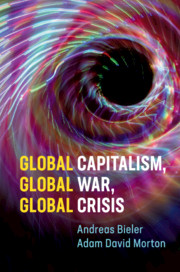Book contents
- Global Capitalism, Global War, Global Crisis
- Global Capitalism, Global War, Global Crisis
- Copyright page
- Dedication
- Contents
- Tables
- Figures
- Acknowledgements
- Abbreviations
- Introduction
- Part I Conceptual Reflections
- Part II Thematic Considerations
- Part III Empirical Interventions
- Conclusion
- Bibliography
- Index
2 - The Centrality of Class Struggle
from Part I - Conceptual Reflections
Published online by Cambridge University Press: 30 April 2018
- Global Capitalism, Global War, Global Crisis
- Global Capitalism, Global War, Global Crisis
- Copyright page
- Dedication
- Contents
- Tables
- Figures
- Acknowledgements
- Abbreviations
- Introduction
- Part I Conceptual Reflections
- Part II Thematic Considerations
- Part III Empirical Interventions
- Conclusion
- Bibliography
- Index
Summary
Every approach within the social sciences implicitly or explicitly adopts a conceptualisation of the relation between structure and agency. Importantly, as Colin Wight reminds us, ‘the agent-structure problem cannot be solved in the sense of a puzzle with an answer, but rather represents competing visions of what the social world is and what it might become’ (Wight, 2006: 4). The purpose of this chapter is to lay out our vision of the agent–structure problem, informed by historical materialism and the philosophy of internal relations as introduced in Chapter 1.
Because any theory has to engage with the agency–structure problem, this issue has been of considerable importance in the broader social science literature. While making no claims to presenting a comprehensive overview, the first section in this chapter looks at some of the more recent key interventions on agency and structure across wider social science debate. Since AlexanderWendt's (1987) seminal article, considerable effort has been spent on developing discussions of the agency–structure problem in international relations (IR). The second section of this chapter assesses more closely key developments in this respect with a particular emphasis on constructivist and poststructuralist scholarship. The third section of this chapter then explores our own, historical materialist conceptualisation of the relation between agency and structure, which will underpin the discussions in the remainder of this book. As Wight emphasises, the agent–structure problem is an ontological question of the nature of the object we are investigating, its constituent elements and the way they are related to each other (Wight, 2006: 63). Hence, this section also includes a discussion of the key structuring conditions of capitalism as well as social class forces as the main collective agents. The objective from a historical materialist perspective, as introduced in Chapter 1, is to emphasise how the philosophy of internal relations enables an appreciation of agent–structure issues within a critical theory of world order. Thus, a further contribution is made to establishing our historical materialist approach in relation to other IR THEORIES, which is one of the key purposes of Part I in this book.
- Type
- Chapter
- Information
- Global Capitalism, Global War, Global Crisis , pp. 27 - 50Publisher: Cambridge University PressPrint publication year: 2018

